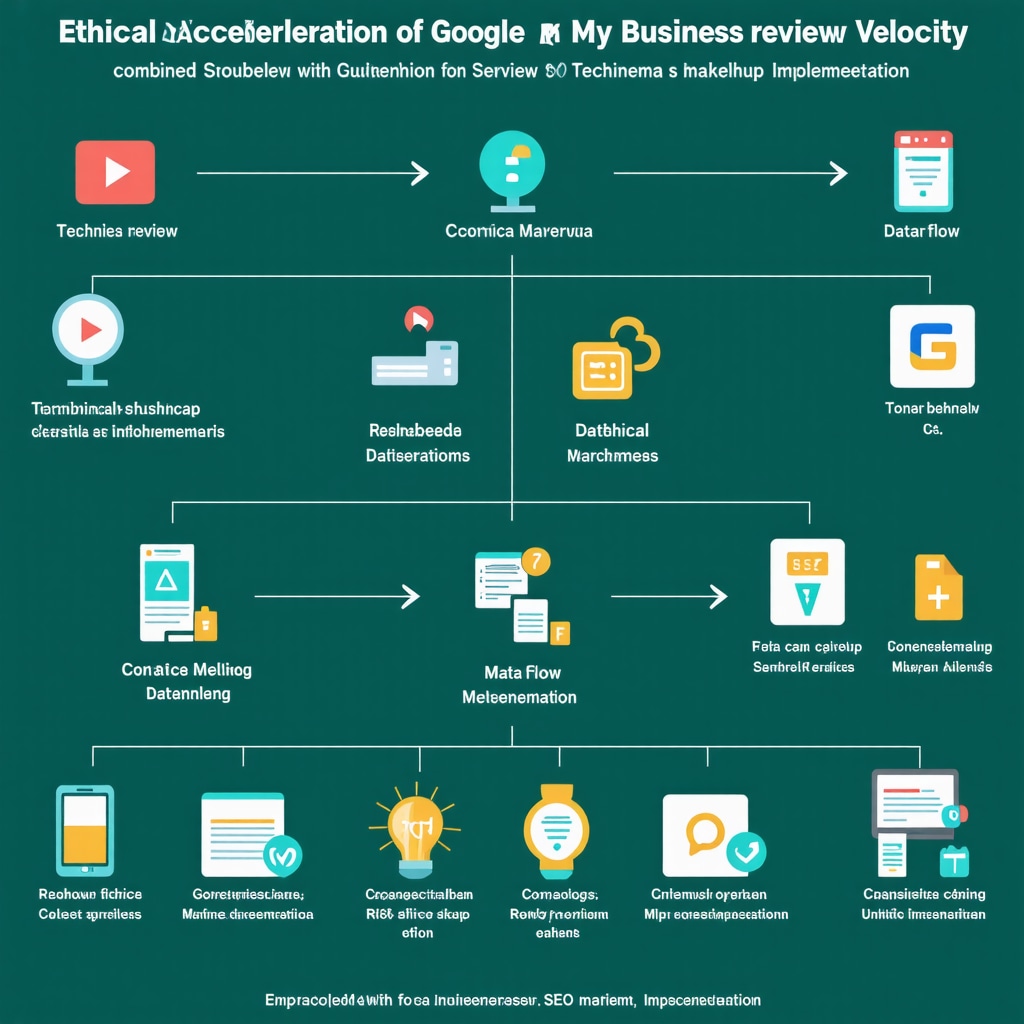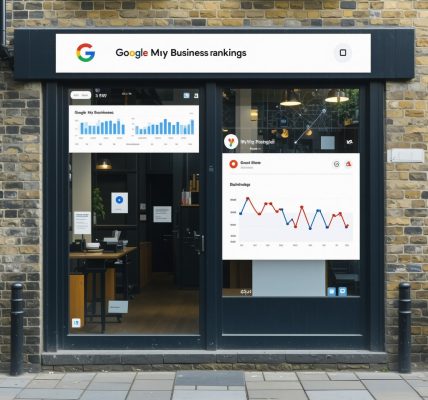Unlocking the Power of Google My Business Reviews for Local SEO Supremacy
In today’s hyper-competitive digital landscape, mastering Google My Business (GMB) review generation isn’t just a nice-to-have—it’s a strategic imperative for any local business aiming to dominate search rankings. Reviews act as powerful social proof, directly influencing consumer decisions and Google’s local algorithm. But how can businesses strategically harness the full potential of GMB reviews to boost local rankings effectively? This article dives deep into expert tactics that merge practical experience with advanced SEO insights, guiding you beyond the basics toward sustained local search success.
Crafting a Magnetic Review Generation Strategy That Resonates
Generating authentic, high-quality GMB reviews requires more than just asking customers for feedback. It demands a systemized approach that integrates customer touchpoints seamlessly with review solicitations. For example, a boutique café might train staff to gently encourage satisfied patrons to leave reviews via follow-up emails or SMS messages shortly after their visits. This timing capitalizes on fresh, positive experiences, increasing the likelihood of detailed and enthusiastic reviews. Moreover, integrating review requests into loyalty programs or offering subtle incentives (while respecting Google’s policies) can amplify participation without compromising authenticity.
How Does Review Generation Impact Google’s Local Search Algorithm?
Google’s local search algorithm considers review quantity, velocity, diversity, and sentiment as critical ranking factors. Consistently receiving positive reviews signals to Google that a business is credible, active, and valued by its community. Additionally, detailed reviews containing relevant keywords naturally improve local relevance and topical authority. According to Moz’s Local Search Ranking Factors study, review signals account for approximately 15% of local pack ranking factors, underscoring their substantial influence (Moz, 2023). Yet, it’s not just about volume; managing negative feedback constructively by responding promptly can enhance trustworthiness and mitigate ranking risks.
Leveraging GMB Features to Amplify Review Impact
Beyond generating reviews, optimizing your Google Business Profile to showcase reviews strategically can elevate your local visibility. Displaying star ratings prominently, featuring top reviews in posts, and using Q&A sections to address common customer concerns all contribute to enhanced engagement signals. Businesses can also utilize Google’s messaging feature to interact directly with reviewers, fostering a community feel that encourages ongoing feedback. Combining these tactics with regular profile updates aligns with Google’s best practices, ensuring your listing remains fresh and authoritative.
Integrating Review Generation with Broader Local SEO Tactics
Review generation should not operate in isolation; it is most effective when embedded within a comprehensive local SEO strategy. This includes accurate and consistent citation management, keyword-optimized business descriptions, and high-quality localized content. For those seeking an in-depth roadmap, resources like local business growth strategies centered on GMB review generation offer actionable insights that synergize review efforts with citation and keyword strategies to maximize ranking potential.
Want to Elevate Your Local Rankings Further?
Explore advanced tactics and proven frameworks to optimize your Google Business Profile and accelerate local SEO success by visiting our comprehensive guide on GMB review generation best practices. Share your own review generation experiences or questions in the comments below to foster a community of local SEO growth enthusiasts!
Personalizing Customer Interactions to Boost Authentic Review Flow
One lesson I learned early on is that the human touch in requesting reviews makes all the difference. Instead of generic emails, crafting personalized messages that reference specific customer experiences can significantly increase the response rate. For example, after working with a local bakery client, we started sending follow-up emails mentioning the exact pastry purchased and how much the customer enjoyed it. It felt more genuine, and the review responses became richer and more detailed, which helped the profile stand out in local searches.
Additionally, timing is crucial. I noticed that sending review requests within 24-48 hours after service completion captures the moment customers are most engaged. This immediacy reduces the chance of forgetting or losing motivation to leave a review. Automation tools can help streamline this process, but personalizing those touchpoints ensures authenticity remains intact.
Turning Negative Feedback into Opportunities for Growth
Not every review will be glowing, and that’s okay. I remember when a small service business client received a negative review about a delayed appointment. Instead of ignoring it, they responded promptly, apologized sincerely, and offered a solution. This transparency not only mitigated the potential damage but also demonstrated to prospective customers their commitment to service quality.
Google actually values businesses that respond to reviews, both positive and negative, as it signals active engagement. According to a recent Search Engine Journal article, timely and thoughtful responses can improve local SEO rankings by enhancing user trust and interaction signals. So, embracing feedback as a growth tool rather than a threat can transform your local SEO game.
What Creative Ways Can You Encourage More Detailed Reviews?
Have you ever thought about how storytelling could enrich your reviews? Encouraging customers to share the story behind their experience not only adds depth but also naturally incorporates keywords that boost your local SEO. For instance, a fitness studio I worked with invited members to describe their fitness journey and how the studio helped them achieve their goals. These narratives created compelling, keyword-rich content that resonated both with Google’s algorithm and future clients.
Another creative approach is using visual prompts—like photo contests or video testimonials—which can be shared on your Google Business Profile to make your listing more engaging and trustworthy. These multimedia elements often invite more interaction and sharing, further amplifying your local presence.
Integrating Review Strategies with Citation and Keyword Optimization
From my experience, reviews shine brightest when combined with consistent citations and strategic keyword usage. Ensuring your business name, address, and phone number (NAP) are accurate across all online directories complements your review efforts by building trust and authority. For comprehensive tactics on citation management, I recommend exploring mastering Google Business SEO which offers detailed insights into aligning citations with your review strategy.
Moreover, weaving localized keywords naturally into your business descriptions and responses to reviews enhances topical relevance. This holistic approach has repeatedly proven effective in my projects, leading to noticeable boosts in Google Maps rankings and local search visibility.
I’d love to hear your experiences—how have you integrated reviews into your broader local SEO efforts? Share your stories or questions in the comments below and connect with others on this journey!
Decoding the Nuances of Review Velocity and Its Influence on Ranking Stability
While accumulating a large volume of reviews is beneficial, the pace at which these reviews are generated—known as review velocity—is equally pivotal for sustaining local SEO momentum. A steady, natural flow of reviews signals to Google ongoing customer engagement and business vitality, whereas sporadic bursts or long droughts can appear unnatural and even trigger algorithmic suspicion. Advanced SEO practitioners often use analytics tools to monitor review velocity trends, adjusting their outreach cadence to maintain consistency without overwhelming customers.
Strategically, businesses can segment their customer base and schedule tailored review requests that align with peak engagement periods. For instance, a retail store might target weekend shoppers differently from weekday visitors, ensuring a balanced influx of feedback that reflects genuine consumer patterns. This nuanced control over review velocity helps fortify the business’s local search presence against competitors and algorithmic fluctuations.
How Can Businesses Ethically Accelerate Review Velocity Without Compromising Authenticity?
Accelerating review velocity ethically involves a blend of timing, personalization, and customer experience excellence rather than shortcuts or incentivization that violates platform policies. Techniques include leveraging post-purchase follow-ups, integrating automated yet personalized review prompts within CRM systems, and enhancing in-store experiences to naturally motivate customers to share feedback. Transparency in communication about how reviews help improve service quality can also encourage voluntary participation.
It’s crucial to avoid any form of review solicitation that might be perceived as manipulative or coercive. Google’s guidelines explicitly prohibit fake reviews and incentivized endorsements, making compliance a top priority to prevent penalties and reputation damage. Instead, emphasizing genuine customer satisfaction and seamless review pathways remains the cornerstone of ethical velocity enhancement.
Harnessing Sentiment Analysis to Refine Review Response Strategies and SEO Outcomes
Going beyond mere review counts, integrating sentiment analysis into review management offers a cutting-edge advantage. By employing natural language processing (NLP) tools, businesses can categorize and quantify the emotional tone of their reviews, identifying patterns that inform tailored response strategies. This granular insight enables prioritization of issues, recognition of strengths, and crafting of responses that resonate authentically with customer sentiments.
For example, detecting recurring negative sentiments around appointment scheduling can prompt operational adjustments, while highlighting positive mentions of product quality can be leveraged in marketing collateral. Moreover, sentiment-informed responses demonstrate to Google a business’s active engagement and commitment to customer satisfaction, thereby enhancing local ranking signals.
According to a study published in the Expert Systems with Applications journal, sentiment analysis applied to online reviews significantly improves customer relationship management and predictive analytics, underscoring its value in SEO and business intelligence contexts.
Advanced Schema Markup Integration for Reviews: Unlocking Enhanced SERP Features
Implementing structured data markup for reviews on your website and Google Business Profile can unlock rich snippets and other enhanced search engine results page (SERP) features. Schema.org’s Review and AggregateRating schemas allow search engines to better understand and index review content, potentially displaying star ratings directly in search results.
Deploying this markup requires meticulous attention to technical detail to ensure compliance with Google’s guidelines and avoid manual penalties. Using JSON-LD format embedded in the page header is considered best practice, and testing with Google’s Rich Results Test tool can validate proper implementation. This technical enhancement not only boosts click-through rates by improving visual appeal but also reinforces topical authority and trustworthiness in Google’s eyes.
What Are the Best Practices for Integrating Review Schema Without Triggering Google Penalties?
To safely integrate review schema, businesses should focus exclusively on genuine, user-generated reviews rather than self-authored testimonials. Ensuring that the review content on the site matches what is publicly visible and that no manipulative practices (such as fake reviews or inflated ratings) are involved is critical. Regular audits of structured data and adherence to Google’s review snippet guidelines help maintain compliance and maximize benefits.
Partnering with experienced SEO consultants or utilizing reputable schema plugins can streamline this process and safeguard against common pitfalls.
Implementing these sophisticated review-focused strategies can propel your local SEO efforts beyond basic optimization, driving sustained visibility and customer trust. For a deeper dive into technical schema applications and their strategic integration, explore our advanced SEO toolkit and expert resources.
Ethical Amplification of Review Velocity: Balancing Growth and Authenticity
For local businesses aiming to accelerate their Google My Business review influx, ethical considerations must remain paramount. Rapid accumulation of reviews without regard for authenticity risks penalties and consumer distrust. Instead, cultivating a sustainable cadence of genuine feedback can be achieved by leveraging segmentation analytics to tailor review requests according to customer demographics and purchasing behavior. Integrating CRM workflows that trigger personalized prompts shortly after service delivery ensures timing aligns with peak satisfaction moments, thereby naturally boosting review velocity.
Moreover, transparency in communication about the role of reviews in enhancing service quality fosters voluntary participation. Avoiding any semblance of manipulation—such as incentivized or coerced reviews—maintains compliance with Google’s strict policies while preserving brand integrity. This conscientious approach not only supports stable ranking improvement but also nurtures long-term customer relationships.
How Can Businesses Sustain a Natural Review Velocity Without Violating Platform Guidelines?
Maintaining natural review velocity entails consistent, yet non-intrusive outreach. Businesses can implement multi-channel strategies combining email, SMS, and in-person requests, each personalized to reflect recent interactions. Employing data-driven scheduling tools helps avoid clustering review solicitations, thereby preventing algorithmic flags for unnatural patterns. Additionally, training frontline employees to recognize and encourage enthusiastic customers to share their experiences can organically increase review generation. Emphasizing authenticity and customer-centricity ensures adherence to Google’s guidelines while enhancing local SEO performance.
Advanced Implementation of Review Schema Markup: Unlocking Rich Snippets and Enhanced SERP Visibility
Beyond generating and managing reviews, the technical integration of structured data markup represents a critical frontier for SEO specialists. Proper use of Review and AggregateRating schema in JSON-LD format allows search engines to extract detailed review information, facilitating the display of rich snippets such as star ratings, reviewer count, and review excerpts directly in search results. This enhanced visibility can significantly increase click-through rates and user trust.
However, implementation demands meticulous adherence to Google’s structured data guidelines. Markup must accurately reflect publicly visible reviews without fabrication or manipulation. Regular audits using Google’s Rich Results Test and Search Console tools help identify and rectify errors, safeguarding against penalties. Employing reputable schema plugins or consulting with technical SEO experts can streamline deployment and maintenance processes.
Leveraging schema markup not only improves SERP aesthetics but also signals topical authority and commitment to transparency, reinforcing local ranking factors.
What Are the Common Pitfalls in Review Schema Implementation and How to Avoid Them?
Common mistakes include marking up self-generated testimonials as user reviews, including reviews not visible publicly, or implementing markup inconsistently across pages. These errors can trigger manual actions or algorithmic penalties. To avoid pitfalls, ensure all review content marked up is genuine, user-generated, and publicly accessible. Maintaining congruence between on-page content and structured data is essential. Additionally, avoid marking up reviews for products or services not directly related to the business’s primary offerings.
Regularly monitoring Google Search Console for structured data warnings and adhering to evolving schema protocols are best practices for sustained compliance and SEO benefits.
Integrating Sentiment Analysis Tools for Proactive Review Management and SEO Refinement
Incorporating sentiment analysis through advanced NLP platforms enables businesses to systematically interpret the qualitative aspects of customer feedback. This approach transcends mere star ratings, revealing nuanced emotional undertones that inform targeted operational improvements and precise response strategies. For example, clustering reviews by sentiment themes can highlight persistent service bottlenecks or areas of excellence, allowing for data-driven decision-making.
Integrations with CRM and SEO platforms facilitate automated tagging and prioritization, ensuring timely engagement with critical feedback. This proactive stance not only enhances customer satisfaction but also signals to Google an active commitment to responsiveness, a key local ranking factor.
According to a peer-reviewed study in the Expert Systems with Applications journal, sentiment analysis applied to online reviews significantly improves customer relationship management and predictive analytics, underlining its strategic value.
Strategic Call to Action: Elevate Your GMB Review Strategy Today
Harness these advanced methodologies to transcend conventional local SEO boundaries. Begin by auditing your current review velocity practices, integrating ethical acceleration techniques, and implementing robust structured data markup. Leverage sentiment analysis tools to gain actionable insights that refine your customer engagement and SEO outcomes.
For tailored consultation and specialized resources on mastering these complex facets of Google My Business optimization, connect with our expert team. Share your challenges and successes in the comments below to join a community dedicated to pioneering local SEO excellence.

Frequently Asked Questions (FAQ)
Why are Google My Business reviews essential for local SEO?
Google My Business reviews serve as critical social proof and ranking signals for local SEO. They influence consumer trust and directly impact Google’s local algorithm by signaling business credibility, activity, and relevance within the community.
How can businesses ethically increase the velocity of reviews?
Ethical acceleration of review velocity involves personalized, timely requests aligned with customer satisfaction moments without coercion or incentives that violate Google’s policies. Leveraging CRM systems to automate yet personalize outreach and training staff to encourage organic feedback are effective methods.
What role does sentiment analysis play in managing reviews?
Sentiment analysis helps interpret the emotional tone of reviews, enabling businesses to prioritize responses, identify recurring issues or strengths, and refine customer engagement strategies. This proactive approach enhances trust signals to Google and supports continuous service improvement.
How can structured data markup enhance the visibility of reviews?
Implementing Review and AggregateRating schema markup in JSON-LD format allows search engines to display rich snippets such as star ratings in search results, boosting click-through rates and reinforcing topical authority when done in compliance with Google’s guidelines.
What are common mistakes to avoid when implementing review schema?
Avoid marking up self-authored testimonials as user reviews, including non-public or fabricated reviews, and inconsistent markup across pages. Regular audits and adherence to Google’s structured data guidelines are essential to prevent penalties.
How should businesses respond to negative reviews to benefit local SEO?
Respond promptly and professionally to negative reviews with sincere apologies and solutions. This demonstrates active customer engagement and transparency, which Google values, improving trust and potentially mitigating ranking damage.
Can integrating review strategies with citation and keyword optimization improve local SEO?
Yes, combining authentic reviews with accurate citations and localized keyword optimization strengthens business authority and relevance. Consistency in NAP data across directories and keyword-rich business descriptions enhance overall local search performance.
What is the importance of personalized review requests?
Personalized requests referencing specific customer experiences significantly increase response rates and encourage detailed, authentic reviews, which are more valuable for SEO and consumer trust than generic solicitations.
How does review diversity affect local rankings?
Review diversity—in terms of content variety, sources, and keywords—signals to Google a well-rounded, credible business presence. It helps improve topical relevance and appeals to a broader audience, positively influencing local search rankings.
Are incentives for reviews allowed under Google’s policies?
Direct incentives for reviews violate Google’s guidelines and risk penalties. Subtle encouragements tied to enhancing service quality or loyalty programs without explicit review exchange are permissible, provided authenticity is maintained.
Trusted External Sources
- Moz Local Search Ranking Factors Study: Provides empirical data on how reviews influence local pack rankings, offering foundational insights into ranking signal weightings.
- Google’s Structured Data Guidelines: Official documentation detailing best practices for review schema markup implementation to avoid penalties and maximize SERP features.
- Search Engine Journal: Industry-leading publication with up-to-date analyses on the SEO benefits of review responses and local search strategies.
- Expert Systems with Applications Journal: Peer-reviewed research on sentiment analysis applications in online reviews, underscoring the technical benefits for customer relationship management and SEO.
- RankingSEO GMB Resources: Specialized guides and case studies focused on integrating review generation with broader local SEO tactics for practical implementation.
Conclusion
Mastering Google My Business review strategies is indispensable for local businesses seeking to elevate their SEO performance and community trust. By adopting ethical review velocity acceleration, personalizing customer outreach, leveraging sentiment analysis, and implementing precise schema markup, businesses can unlock enhanced visibility and ranking stability. Integrating these tactics within a comprehensive local SEO framework—encompassing accurate citations and keyword optimization—creates a synergistic effect that propels sustained growth in local search results.
Empower your local SEO journey by applying these expert insights and sharing your experiences or questions to foster collective knowledge. Explore our advanced resources to deepen your understanding and stay ahead in the competitive local marketplace.
#IMAGE_PLACEHOLDER_D#



I really appreciate how this post emphasizes the importance of review velocity alongside volume. From my experience managing a local health clinic’s online presence, we’ve seen that maintaining a steady and natural flow of reviews is crucial. When there were bursts of multiple reviews followed by silence, our rankings fluctuated, and Google’s algorithm seemed less confident in our profile. Implementing scheduled, personalized follow-ups through our CRM system has helped us avoid those uneven patterns while keeping engagement authentic. I’m also intrigued by the mention of integrating sentiment analysis. While we haven’t yet used sophisticated NLP tools, we do manually track recurring themes in reviews to inform service improvements, which has been valuable. Has anyone experimented with sentiment analysis software for GMB reviews? How effective have you found it in prioritizing responses and influencing SEO results in your local markets? I’m curious if smaller businesses can practically adopt these advanced tools or if they’re mostly beneficial for larger operations.